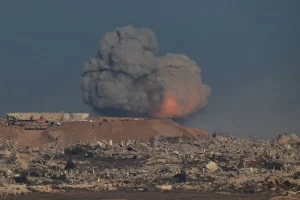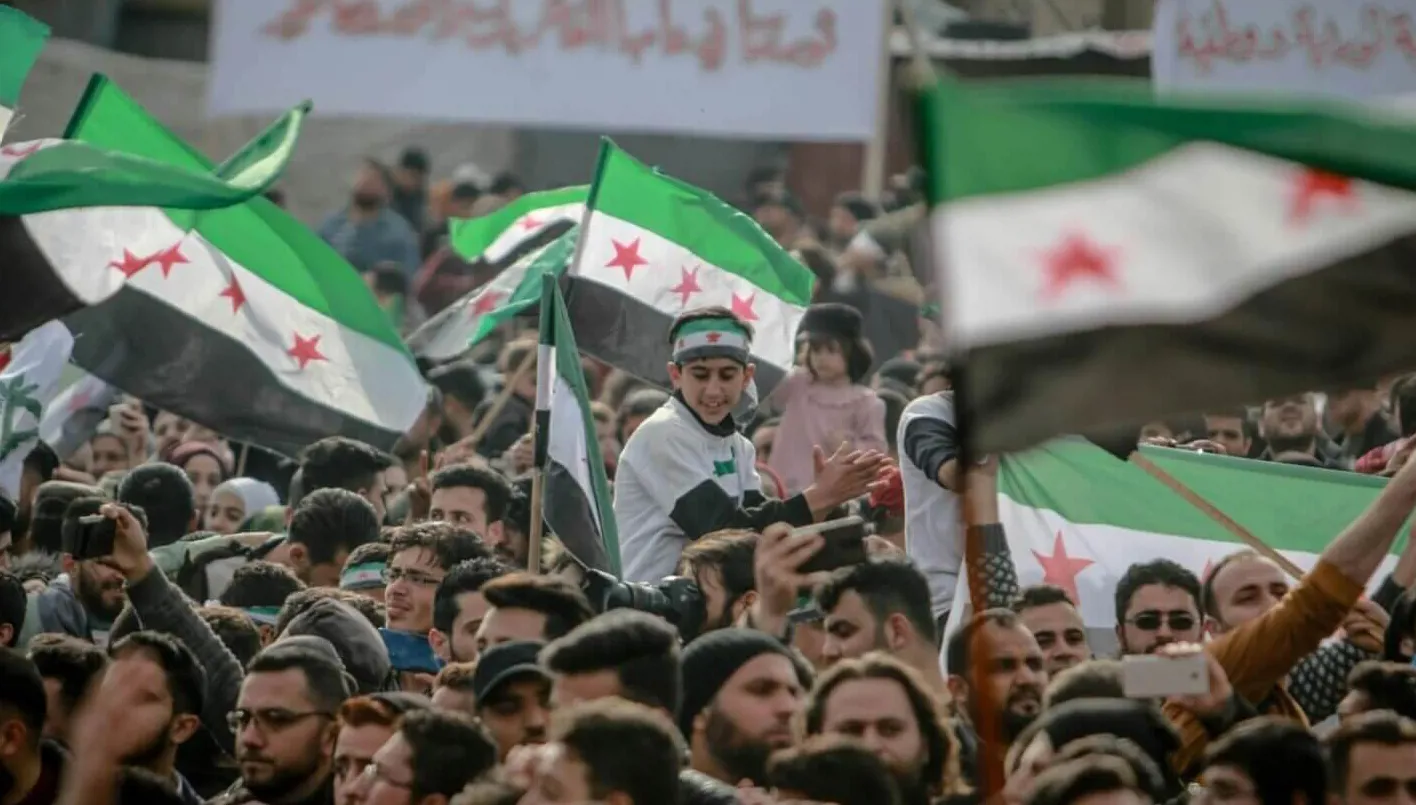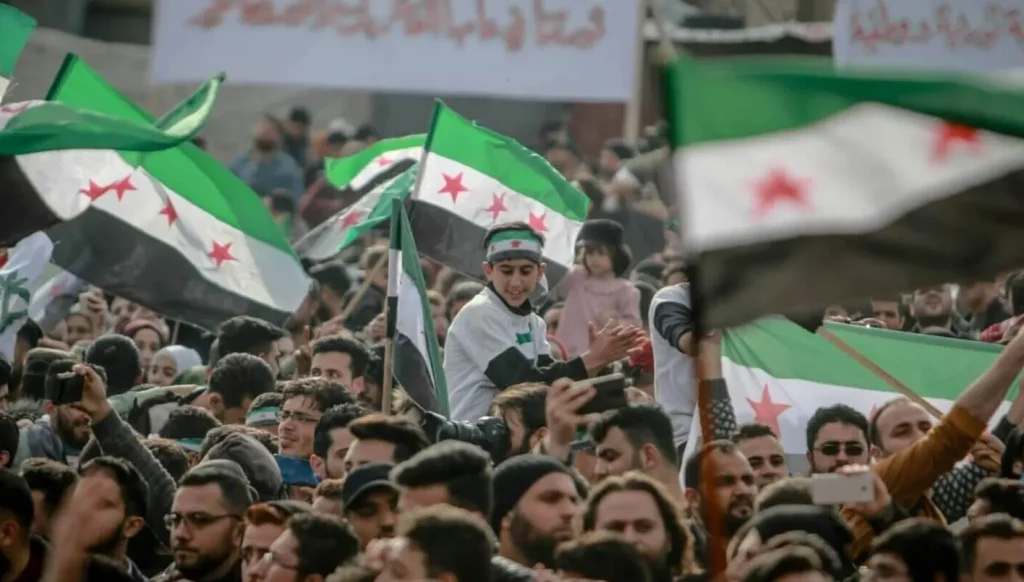More than half of Syrians believe the country is heading in the right direction. (AFP)
The 2025 Syria edition of the “Arab Barometer” reveals a complex picture combining waves of optimism about the future with deep concerns about the present. While Syrians express growing satisfaction politically and security-wise after a decade of war and division, the data also expose a fragile economic and social reality that threatens to undermine this morale unless quickly translated into tangible improvements in people’s lives.
The survey was based on a broad representative sample of 3,690 individuals from various provinces and socio-economic groups, with a margin of error between 2 and 3%, and a confidence level of 98%. Fieldwork was conducted over 25 days between July 25 and August 17, 2025, involving more than 100 researchers, lending the results strong scientific validity and high reliability.
Political Optimism vs. Economic Hardship
Results show that more than half of Syrians believe the country is moving in the right direction, with 57% rating the political situation and 56% the security situation as good or very good. Between 80% and 94% expressed feelings of hope and relief following the fall of the previous regime, indicating a significant emotional shift after many years of fear and deadlock.
However, behind this optimistic picture lies a harsh economic reality: 42% of households live in poverty, 43% barely get by, and only 11% live in abundance. Six out of ten respondents said they rarely eat meat, while about one-third of households depend on remittances from abroad to meet their needs. These figures place political optimism in direct confrontation with livelihood challenges, posing a real test for any authority to link security stability with improved daily living conditions.
Growing Democratic Tendencies
Despite economic burdens, the results reveal advanced awareness of democracy and pluralism. Sixty-one percent see the democratic system as the most suitable for Syria today, and 60% believe democracy, despite its flaws, remains better than other systems. Notably, 53% expressed willingness to accept power transfer even if a party they do not support wins, provided it occurs through free and fair elections. These data reflect increasing recognition that democracy is no longer a luxury or a threat of chaos but a necessary framework for managing diversity and ensuring stability.
Nevertheless, this popular inclination finds no clear translation in the current political structure, which remains temporary and concentrated in narrow powers, lacking broad representation mechanisms for various groups. This contradiction between public desires and political practice may pose a deferred legitimacy dilemma if left unaddressed.
Between Coexistence Discourse and Division Reality
Socially, 64% of respondents believe Syrians have succeeded to varying degrees in merging into one family unit, while a majority ranging between 66% and 78% do not object to living next to people of different sects or religions. Yet, 85% acknowledged the spread of sectarian rhetoric, and 83% the existence of sectarian and religious discrimination. This paradox reveals that tendencies toward coexistence and openness clash with daily realities that perpetuate division, and that Syrian national identity is still in formation and can be rebuilt if inclusive policies and comprehensive transitional justice are available.
Position on Israel: A Rare National Consensus
On regional issues, Syrians showed remarkable consensus regarding Israel. Seventy-eight percent consider it the greatest threat to the region, 55% see it as the primary danger to Syria itself, 74% reject recognizing it, and 70% oppose any peace agreement without the return of the Golan Heights. This unified stance reflects that Palestine and the Golan remain elements that unite Syrians despite internal divisions, providing a cross-sectarian national basis for building inclusive national discourse. However, it also presents any quick pragmatic approach with strong social resistance.
Religion and Politics: Toward a Civil Approach
The results also indicate a growing popular tendency toward separating religion from politics, with 57% supporting the separation of religion and state, and 59% viewing religiosity primarily as ethical behavior rather than rituals alone. These figures suggest the public mood prefers to keep religion in its personal and spiritual domain while managing public affairs on civil grounds. If this tendency is harnessed, it could form a foundation for rebuilding the state away from religious politicization that fueled divisions during the war years.
Digital Space: Freedom Limited by Misinformation
The virtual space has emerged as a new element in public life, used by 78% of Syrians, with 98% having social media accounts. Seventy percent use it to express political views, 67% to engage with public issues, while 76% affirm they can criticize the government without fear. These figures reveal unprecedented expansion of the digital public sphere, but it is accompanied by a negative side: 78% see these platforms as reinforcing sectarian discourse, and 80% believe they contribute to spreading misinformation. Thus, the virtual space opens doors for expression and participation but can also become a tool for reproducing division.
A Dual Picture
The overall picture drawn by the “Arab Barometer” in Syria 2025 is a mix of hope and concern, openness and discrimination, aspiration for democracy versus fears of poverty and fragmentation. These results indicate that Syrians hold a moral capital that can form a basis for building new political legitimacy, but this capital is fragile and susceptible to erosion if not quickly translated into tangible improvements in living and political conditions.














Recommended for you
Exhibition City Completes About 80% of Preparations for the Damascus International Fair Launch
Talib Al-Rifai Chronicles Kuwaiti Art Heritage in "Doukhi.. Tasaseem Al-Saba"
Unified Admission Applications Start Tuesday with 640 Students to be Accepted in Medicine
Egypt Post: We Have Over 10 Million Customers in Savings Accounts and Offer Daily, Monthly, and Annual Returns
His Highness Sheikh Isa bin Salman bin Hamad Al Khalifa Receives the United States Ambassador to the Kingdom of Bahrain
Al-Jaghbeer: The Industrial Sector Leads Economic Growth